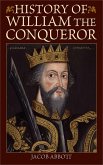In "William the Conqueror," Edward A. Freeman delivers a comprehensive examination of one of history's most pivotal figures, exploring the life and reign of William I of England. Freeman's meticulous narrative combines biographical detail with socio-political analysis, set against the backdrop of 11th-century Europe. The book interlaces historical fact with vibrant prose, eschewing dry academic language for a style that reflects Freeman's deep passion for history, making it accessible yet intellectually rigorous. His exploration delves into William's strategies, battles, and the socio-cultural transformations sparked by the Norman Conquest, contributing to a richer understanding of medieval England's fabric. Edward A. Freeman was a prominent historian and advocate of rational historical analysis. His extensive educational background and engagement with contemporary historians influenced his approach to writing this biography. Freeman's dedication to uncovering the nuances of the past stemmed from a desire to inform readers about the significance of historical events and figures, particularly those whose legacies have dramatically shaped the course of nations. His scholarly work reflects a commitment to vibrant storytelling grounded in thorough research. This book is an essential read for those interested in understanding the formidable impact of William the Conqueror on Britain's history. Freeman's expert insights and compelling narrative invite readers to appreciate the complexities of conquest and governance, making it a vital resource for both scholars and history enthusiasts alike.
Dieser Download kann aus rechtlichen Gründen nur mit Rechnungsadresse in A, B, BG, CY, CZ, D, DK, EW, E, FIN, F, GR, H, IRL, I, LT, L, LR, M, NL, PL, P, R, S, SLO, SK ausgeliefert werden.









